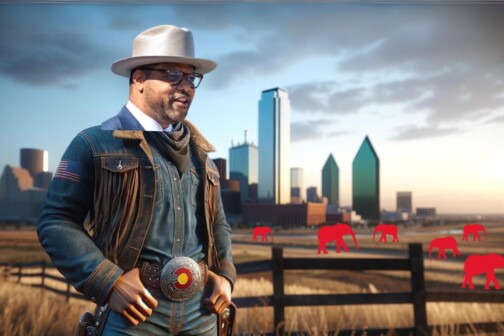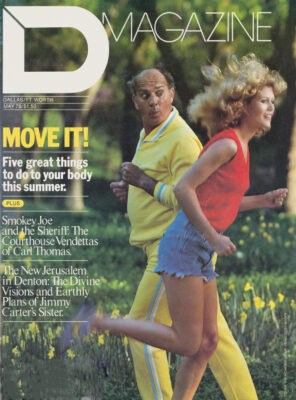Recently, Marshall Terry, novelist, short story writer, and professor of English at SMU, dropped off a manuscript at the magazine offices with an apologetic note attached to it:’ ’I know you’ ve had a piece on Bloom,” Terry wrote, “but this is different. I wrote it just because I’ve been wanting to do it for a while.”
Sam Bloom is one of Dallas’ mythic figures, an advertising man, founder of one of the city’s biggest agencies. And a larger-than-life personality. Everyone who has worked with him has “Bloom-stories.” A little less than three years ago, we published David Ritz’s reminiscences of things Bloomian, and were flooded with calls and letters offering up dozens of further stories. We offer you here yet another version of the Bloom myth.
When, in 1956, a lad of 25, I entered the sanctum of the great man, I had no idea that I was entering one of the memorable adventures of my life. This man, whose name was Sam Bloom, was very large. He sat in a huge chair behind a huge desk in his office in the Fidelity Union building. His soft brown eyes were hooded with thick black-rimmed glasses, his generous mouth at half-smile, shaggy head cocked as if he heard the song of a lark off somewhere. He looked as if he wondered just who in the hell I could be and who had let me wander in. His enormous hand rested on the telephone, completely hiding it.
Already i had heard the story, probably apocryphal but certainly believable, that he had lost 100 pounds one year and been quite sad because nobody noticed.
He smiled a dazzling, embracing smile, the great tufts of his eyebrows lifting, and hunched over the desk towards me as I stood awkwardly on his carpet.
“Sit down,” he said. “What is it that you want?”
“Thank you, sir. A job. Marsh Terry. Bob Burnham suggested … I think you have my resume there.”
He looked at the stacks on his desk. Then he creaked back, lit a cigaret, took it down nearly to ash in two puffs. I thought he must have noticed me sitting outside his office as he came and went, for I had been sitting there a week. Burnham, the good-hearted Alabama boy who was his production manager, had said, “Just sit there. He’ll see you sooner or later.”
“Do sit down, Morris,” he said kindly. “No sense standing there with a daisy in your hair.”
“Yes, sir, Mr. Bloom,” I said. I had been told that was the correct response in all situations.
“What do you think you can do?” he said.
“Well, sir, I have been a teaching fellow at SMU, teaching freshman English, and then I went off to graduate school and came back, and I’ve been trying to write stories, fiction I mean, and my father is in advertising in Ohio, and he thought … I don’t really have much experience, Mr. Bloom, but I was an honors English major and I’ve always been told that a good liberal education prepares you to do anything . . .”
“Like hell,” he said.
He swivelled away from me, lit another cigaret, got the telephone in his huge paw and began to dial it. With immense perspicacity, doubtless the result of my liberal arts background, I sensed the interview was over, and tiptoed out.
In the hallway outside the door I said to Burnham, “What do I do now?”
“Sit down. I bet he hires you. He loves the idea of education, teaching. You don’t have anything else to do, do you?”
I sat there two more days.
Late in the afternoon of the third day, he came sailing out, then turned back and regarded me.
“Go pack your bag,” he said. “Meet me at the train station at five-thirty. We’re going West.”
“Yes, sir.” But he was already down the hall, old crushed brown hat on his black and silver mane. He moved fast for a big man. He was a country boy from Clarksville.
“But where are you going?” my wife asked.
“What does it matter? West. I think I have a job.”
I had been freelancing for six months and had sold nothing. We had a baby. 1 was startled when he popped the job at me, had no idea what I was getting into, but I liked Bloom. He was right out of Dickens. He had what my Daddy called the “stuff.”
It was springtime on the prairie. With a sense of adventure I donned my one respectable suit, packed two novels and a volume of Robert Frost, and presented my-_sejf at the train station. The only problem with the suit was that I had burned a hole in the front of the pants with ashes from the shiny pipe I affected. This caused me always to keep a book or newspaper in my hand, which I would hold nonchalantly over the affected part in company.
I met the man and we embarked. We were to share a roomette on the train. I tried to follow him into it but found he took up all the space. Graciously he came back out and I went in and nestled in the upper berth, where I stayed as we rolled on to Abilene and points west.
The purpose of our trip was to visit Fed-way and Zales stores, his accounts. My function was never quite clear, but I toted our bags happily, shook hands with store managers, and agreed with Mr. Bloom about the merchandising in the stores, about which I knew absolutely nothing.
Unlike that other mythic figure of a Bloom, who ate with relish the inner organs of beasts and fowls, my man had a taste for chocolate candy. Recently he had bought the Martha Washington Candy Company. His logic was simple: He loved candy, so everyone would love and buy his candy. One bracing afternoon in downtown Albuquerque, against the backdrop of the purple mountains, he decided to test the wares of a competing confectioner.
We entered a candy store. He put down a large bill and arrayed a dozen boxes of the enemy chocolates along the counter. Then he tore down the line like a cyclone, ripping open the candy boxes and tasting this and that. Finally, content the stuff could not hold a candle to dear old Martha Washington, he stopped at the end of the line of ruptured boxes and turned and smiled his beautiful smile, embracing me and the conquered candy with a large sweep of his hand.
“Does your wife like candy?” he said.
I chose an only slightly damaged box of chocolate creams.
That night, walking under the New Mexico moon, we discussed the poetry of Frost, and of advertising.
Rolling home, he suggested that I had a job now and might buy another suit. I would need both hands free in this business, he said.
Back in Dallas, he started me in his wondrous world slowly, as a father might give his uncertain son easy tasks to do around the house. He put me in the copy room, where I sat on call among the Real Writers, waiting for my inning like a short reliever just up from the minors. The copy chief was a bright and lovely girl as wonderfully nutty as the March Hare. Every once in a while she would pop in on us, as we sat before the typewriters in our stalls, and yell encouragingly, “Okay, gang! Let’s squirrel those bears!”
My two steady bears to squirrel were writing radio ad copy for Skillerns and putting together the Freddy Martin radio show. Putting together the Freddy Martin show was some of the best fun I ever had. The trick was to see how many of the worst, soupiest, most incongruous Freddy Martin tunes you could program into one 15-minute segment. There was such a wealth to choose from that it was a challenge.
The Skillerns ads ran between the Freddy Martin numbers on Top Tune Time. I was terribly pleased with my copy. I was getting right into the spring swing of things, paying close attention to the rhythms and sounds and images of the season. This was probably my best:
“This springtime Skillerns would love to help you rejuvenate your lawn and grounds and take care of all your garden needs. Skillerns is featuring the finest fertilizers at reduced spring prices – now you can purchase 100 pounds of Vertagreen for only $2.98 – or 100 pounds of fine Phillips 66 fertilizer for just $3.33. To keep your yard looking jaunty through the coming hot, monotonous months Skillerns is offering 50 feet of lightweight plastic garden hose, for just $1.88. And Skillerns has a complete selection of sprinklers -’Everrain’ swinging sprinklers and ’Poppy’ whirling sprinklers on wheels – to help you keep your yard fresh and green and gorgeous! And of course, with Easter at hand, Skillerns is the practical place to purchase Easter rabbits, eggs, baskets, grass and novelties to please the kids – and grownups too! So shop the specialized, super-value, springtime Skillerns store nearest you!”.
The copy chief did not like it much, even though I pointed out the beauty of the assonance, consonance, and alliteration employed in so short a piece. She also said there was a complaint from the client. We were playing “The Old Lamplighter’” too much. “The Old Lamplighter” was not one of the client’s favorite Freddy Martin tunes.
Mr. Bloom called me in.
“Morris,” he said to me gently, “the client wants a nice, sharp little piece, to sell what he’s got on special in the store. The client wants a nice, sharp roadster. You come rumbling down the road at him with a Mack truck that can’t get out of gear, all camouflaged with language. This is not college, Morris. These spots you are supposed to be writing are not homecoming floats. Read this over. Who is supposed to be saying this? It sounds like T. S. Eliot when he has been dead a while.”
” ’April is the cruelest month,’ ” I said.
“I know,” he said. “We don’t need a poet to tell us that.”
The next time I was called out of the bullpen into his office he was sitting there with another large fellow, a client who had a line of beverages. This fellow had come up with two new wine drinks he wanted to promote, called “Quicktail” and “Hottail.” On the spot they invited me to give them a 20-second TV commercial.
I stood there and stared at them. The client stared at me. The boss gazed out the window. He was deeply concerned about a chocolate thief in the Martha Washington operation in Chicago.
Over the chasm of silence I blurted, “Beer weary? Try Quicktail!”
“Thank you, Morris,” he said. “You may go back now to whatever it was that you were doing.”
My other function was to act as chauffeur for the many clients and important visitors who needed to be met at the airport. Mr. Bloom had a little black Ford which I loved dearly. It was weighted on the right side so that when he got in, it would come plumb. I was a bit lighter than I am now, and enjoyed the challenge of driving the car on a distinct slant to the right. It was like riding a biased camel.
My chauffeuring duties went well. I liked to drive around for hours on the slant listening to radio spots we’d written and smoking Roi Tan cigars. The only trouble was that I had a perverse sense of direction. I finally did learn how to get from Love Field downtown in a straight line. But once I picked up five visiting college presidents in Fort Worth and made some slight mistake on the return to Dallas. They enjoyed seeing the courthouses of various little Texas towns but missed most of their conference. One of them suggested that, with a sense of direction like mine, I should go back to the academic game, advice I later took.
The grandest project I became involved in during my brief stay, and it seems to me still an important one in the course of Dallas’ development and its attendant mythology, was the birth of the Great Southwest industrial district.
This development encompassed 5000 acres of land that had been the Waggoner 3-D ranch of quarterhorse racing fame. (Part of it now holds Six Flags Over Texas.) A group of Dallas and Fort Worth leaders, including the Wynnes of Dallas, got together with the Rockefellers and the legendary William Zeckendorf of Webb & Knapp to develop this industrial district – in what was then called “the industrial profit zone of America.”
In this project the prophetic vision of Sam Bloom flowered. I was involved in writing a prospectus about the region for industrial developers. I have rarely learned more or had a better teacher.
Mr. Bloom was convinced of the basic truth of what I call the Myth of Dallas. By “myth” I do not mean untruth but a basic sense of origin and identity. We all know the elements of the Dallas myth: that Dallas didn’t owe its importance to a navigable river or a cattle trail: that strong men, mostly pioneering merchants, built our city and led it to become, after the railhead was seized from Denton and the State Fair was captured, the southwest-ern center of banking, insurance, retailing and light industry.
It was its geographic centrality and the quality of its people that made it so, Bloom believed. That was the theme that animated Mayor Bob Thornton (who said he went to school at CC&M – “Cotton, Corn and Mule”) and other Dallas leaders and which led to the formation of the Citizens Council for business leadership of the city.
In my prospectus we wooed industry to Great Southwest:
“The first great wealth of Dallas came from cotton. Subsequently many people became rich quickly through oil. The city’s leaders now come from oil, financial, insurance and business groups. Dallas has a keen awareness of social levels, and there is a definite equation between civic control and social position. Position and influence do not rest with certain old families’ as in the South, or with entrenched, traditional interests as in the East. In Dallas what matters is what you have and what you do with it.”
Joined to the Dallas myth was Bloom’s other basic conception: Dallas and Fort Worth were not economic competitors anymore, even if they were still civic rivals. Dallas and Fort Worth and the towns between were a single economic entity. Bloom foresaw the consumer demands of the growing population of this entity; saw that suburban development would create a dispersed urban pattern that freed the area from many of the problems of concentration; foresaw the future growth and vitality of satellite towns like Grand Prairie, Carrollton, and Mesquite.
Bloom saw, back in 1956, what for better or worse we now call the “Metroplex,” and saw clearly the bright social and economic future of the north Texas region.
I worked on public relations for the Great Southwest project. The day came when all the big boys were to gather at the site to close the land deal, and, with much ceremony and press coverage, the outsized check for millions of dollars was to change hands. My ad man father always said, “When promoting something, have balloons.” Well, we had balloons and flags and a festooned platform and striped refreshment tents. Zeckendorf was there, and a Rockefeller or two, and the Dallas-Fort Worth crowd. One of the locals, in fact, came up to my massive mentor to complain of not being photographed by the gathered pride of press, and I will never forget the encouraging reply. “Well, sir,” Mr. Bloom said, watching them take pictures of the Eastern nabobs, “I’m afraid that when Ted Williams is up at bat, nobody’s watching the bat boy.”
The check was to be handed to the old man who was selling his ranch land for the great new industrial development; the ceremony was to be repeated several times for all the flashing bulbs and grinding cameras.
The old man, with his foreman, came out of the ranchhouse to the platform. All the hoopla and excitement washed over him. He was sad to be letting go of the land. It was one of those moments when progress plays against the past. In his face was sadness, a memory and regard for other uses of the land. He accepted the check for seven million dollars. The cameras hummed. He paused, nodded to the developers, then stuck the check in his pocket.
“Time, I guess,” he said to the foreman, “to piss on the fire and call in the dogs.”
Then they turned and walked back to the house.
The picture of Bloom in my memory is a composite drawn from the many meetings I attended with him. I see him in a conference room at the head of the class, the client at his side, his staff dutifully lined up around the room, the several “consultants” he always employed seated among us. There might be, among these experts, the brilliant professor of economics, mind racing under his shock of hair, wanting to break in and talk himself but not doing so; the saturnine psychology prof sitting twirling his cigar, studying human nature; and the energetic artist eager to leap to the easel to unveil his art “concept” for us. Amid the assembled talent, it was the boss who talked, who instinctively went to the heart of the problem and its possibilities, outlining the steps that must be taken so, in his words, we would be “in the ballpark and all around it.” Then he would sit back, beam as if we had all participated instead of just sitting there, and turn to us, his writers. “Now go and get to work,” he’d say. “Take this idea and romance it.”
Eventually I returned to Academe, intent on imparting to my students the values of the liberal arts, and a little practical wisdom when possible. I have not seen Sam Bloom for many years.
About five years after my brief stint in his marvelous world, I returned to his office to visit my friends. He came by as I stood near my old stall in the copywriters’ room. He smiled at me and, strangely getting my name right, said, “Get your work done. Marsh.”
At first, I thought he thought I was still working for him. But then I knew he knew just who and where I was, working in that other vineyard which he had respected enough to hire me once, a fairly useless but hopeful boy.
“Yes, sir, Mr. Bloom,” I said.
Get our weekly recap
Brings new meaning to the phrase Sunday Funday. No spam, ever.
Related Articles

News
White Rock Medical Center Temporarily Stops Receiving Ambulances and DFW Ranks 45th in Latest Hospital Safety Rating
Plus UT Tyler's new dermatology department, Children's Health's honor, and more.
By Bridget Reis

Local News
Mayor Eric Johnson Makes Another ‘Friendly Belt Buckle Bet’
This time its on the Avalanche-Stars game.
By Tim Rogers

Commercial Real Estate
Checking in on HEB’s Plans for the Old Albertson’s in Uptown
The property at Lemmon and McKinney remains undeveloped despite years of announcements and renderings that depicted a $295 million, 25-story mixed use development anchored by a Central Market. What's going on?
By Will Maddox


